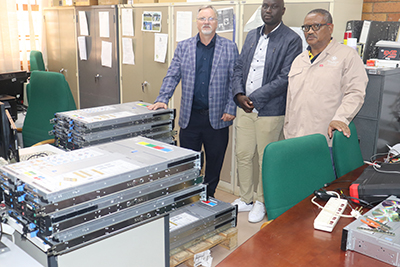by Kgothatso Monono
The Tshwane University of Technology (TUT)’s Faculty of Information and Communication Technology (FoICT) has received a significant donation of computing equipment from CERN, the renowned Switzerland-based research organisation.
Nceba Botha, a Laboratory Technician at FoICT’s curiosity about global scientific developments kick-started the journey towards the donation. Inspired by CERN’s groundbreaking work, particularly with the Hadron Collider and the World Wide Web, Botha discovered CERN's initiative to donate computing equipment to institutions in Africa. Seeing an opportunity, a request to support the FoICT was submitted to CERN.
TUT’s motivation highlighted the pressing need for advanced computing resources to enhance academic programmes for undergraduates and facilitate research for postgraduates. The Faculty is in the process of building a new data centre, which requires powerful equipment to help students conduct cutting-edge research. This donation marks just the beginning of their journey towards becoming leaders in technology and includes: fourteen computing nodes; six storage servers; and five switches, all equipped with quad CPUs, offering robust processing capabilities essential to achieve the University’s academic and research goals.

From left: Dr Etienne Van Wyk: Faculty of ICT Executive Dean, Associate Prof Topside Mathonsi and Nceba Botha.
“This donation will greatly benefit TUT in the Faculty’s process of transitioning to using thin clients, which require more storage and processing power. The donated equipment will act as central servers, allowing students to access powerful computing resources efficiently. Additionally, the new data center will enable further advancement in research and education. The donation aligns perfectly with TUT’s mission to prepare students for the future. TUT aims to provide its students with the best possible education and resources, improving their chances of securing employment upon graduation,” said Nceba Botha.
The process of coordinating the donation involved careful planning and collaboration with freight forwarders to ensure the equipment reached TUT safely. While there were some challenges along the way, they were managed effectively, leading to the successful delivery of the computers.
Nceba added that his perseverance paid off, despite the long process, resulting in a positive outcome that will benefit many.
“TUT is grateful for CERN’s generosity. The support provided not only eases the challenges faced by the university but also inspires hope for a brighter future for its students,” he concluded.
